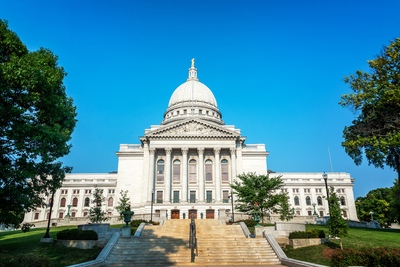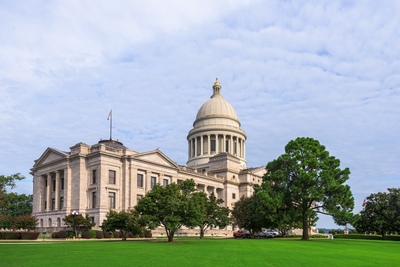
Elections & Campaigns
2026 State Elections Could Reshape Trifecta Control (States to Watch)
February 5, 2026 | Bill Kramer
October 8, 2020 | Billy Culleton, David Shonerd, Lauren Doroghazi, Max Rieper, Morgan Scarboro, Ryan Maness

Key Takeaways:
This is the fifth of several 2020 state elections preview posts we’re publishing as we approach election day. Previously, we discussed state trifectas, legislative supermajorities, state legislative control, and gubernatorial races. You can keep track of all the latest information on our 2020 state elections landing page.
In most states, voters will not only submit their preferences for individuals running to represent them, but they’ll be asked to decide the fate of new laws or constitutional amendments directly. This form of direct democracy is often referred to universally as “ballot measures.”
Currently, 32 states have certified a total of 120 statewide ballot measures for the November 3 ballot. Below, we’ve highlighted a handful of measures because of their broader implications for future state labor, privacy, and tax policy. Californians alone will see 12 statewide measures on their ballot (in addition to potential local measures), including high-profile measures to exclude rideshare drivers from a recent law (CA AB 5) that would classify them as employees and a measure that would expand the protections of the nation’s first major consumer privacy law. Additionally, voters in Arizona, Mississippi, Montana, New Jersey, and South Dakota will decide whether to legalize marijuana for certain uses. 
In 2018, California lawmakers passed a landmark privacy bill to stave off a proposed ballot measure. That law, the California Consumer Privacy Act (CCPA), went into effect this year, but another ballot measure this November would add even more privacy provisions. The measure, known as The California Privacy Rights and Enforcement Act of 2020 or Proposition 24, is backed by privacy activist Alastair MacTaggart, who led the push for the 2018 ballot measure that resulted in the CCPA. Former presidential candidate Andrew Yang has also joined the advisory board backing the measure.
Proposition 24 would establish a new state agency tasked with enforcing California’s privacy law. It would create a new definition of “sensitive personal information” with requirements for consumer notice and a right to limit the use of such information. The measure would limit location tracking used for targeted advertising, require transparency for algorithms, and triple fines for privacy laws relating to children. The measure also amends the CCPA by tweaking enforcement procedures, changing eligibility thresholds for businesses under the CCPA, and extending exemptions under the CCPA for employment information and information from business-to-business communications through 2023, when Proposition 24 would be scheduled to go into effect.
California voters will decide on Proposition 22, which is a result of a $90 million ballot initiative campaign funded by Uber, Lyft, and DoorDash after the enactment of a recent employee classification law (CA AB 5). If the measure is approved, drivers for app-based transportation and delivery companies would be exempt from current state labor law and would be classified as independent contractors. Under Proposition 22, however, independent contractor drivers would be entitled to other compensation such as minimum earnings, healthcare subsidies, and vehicle insurance. Opponents to the measure — primarily labor unions and activists — argue that the benefits provided in the measure pale in comparison to what drivers would earn as employees. It is also worth noting that app-based drivers are the only types of workers included in the ballot measure; the “ABC Test” codified under AB 5 will still apply to other types of workers in determining whether they are employees or independent contractors.
The California property tax system currently revolves around the ubiquitous Proposition 13. In 1978, California voters adopted Proposition 13, which keeps property taxes relatively low by capping property tax rates and, importantly, only allows for the reassessment of property value when property changes ownership. This limitation on reassessment means that unless the property is sold, property taxes cannot drastically increase year-over-year.
This November, however, voters will decide whether to change these protections for commercial property, opening businesses up to the possibility of paying billions of dollars in higher real estate taxes. Proposition 15 would reassess all commercial property worth more than $3 million to the current market value and require reassessment every three years thereafter. If Proposition 15 passes, residential property would retain its favorable assessment treatment. The measure is expected to increase property tax revenue by $6.5-$11.5 billion.
Marijuana legalization is always a hot topic at the ballot due to its popularity with voters, and 2020 is no exception. This year, five states – Arizona, Mississippi, Montana, New Jersey, and South Dakota – will consider seven ballot measures on marijuana legalization. If the ballot measures before voters in Arizona, Montana, New Jersey and South Dakota are approved, 14 states and the District of Columbia will have legalized recreational marijuana. Ballot measures in Mississippi and South Dakota would legalize medical marijuana and if approved, bring the total number of states with legalized medical marijuana to 35 states and the District of Columbia.
The first of these measures, Proposition 207 in Arizona, would legalize the possession and use of recreational marijuana by adults 21 years of age or older. Voters previously weighed in on this issue in 2016 when Proposition 205 was narrowly defeated with 51.3 percent of those casting ballots voted “no.” That year, Arizona was the only state of five that did not approve its recreational marijuana legalization ballot measure.
Voters in Mississippi will decide on Ballot Measure 1, weighing in on whether or not to amend the state constitution to legalize medical marijuana in the state. If voters cast an “either measure” vote (as opposed to “neither measure,” a vote against legalization), they’ll be prompted to choose between Initiative 65 and Initiative 65A. The primary difference between the two initiatives is that Initiative 65 enumerates many of the details around legalization, like qualifying conditions and the tax rate, while Initiative 65A allows the legislature to set many of the rules.
Two complementary ballot measures to legalize recreational marijuana will appear before Montanans. The first, I-190, would legalize the possession and use of recreational marijuana for adults 21 years of age or older, while CI-118 amends the state constitution to allow the legislature or an initiative to establish the legal age for purchasing, consuming, or possessing marijuana.
In New Jersey, voters will decide on Public Question 1, which would legalize recreational marijuana for adults over the age of 21. Recent polling has shown that about 65 percent of respondents in the state are in favor of passing the measure.
Finally, voters in South Dakota will weigh in on two marijuana legalization ballot measures. Initiated Measure 26 would legalize medical marijuana while Constitutional Amendment A would legalize the recreational use of marijuana for individuals 21 years of age and older.
A ballot measure appearing before voters in Colorado would establish a paid family and medical leave program in the state. Proposition 118, if approved, would create a state-run program to provide 12 weeks of paid family and medical leave to employees: suffering from a serious health condition; caring for a relative with a serious health condition; after the birth or adoption of a child; requiring safe leave; or taking exigency leave related to a family member’s active duty service. An additional four weeks of paid leave would be available for complications arising from pregnancy or childbirth. The program would be funded through employer and employee contributions, and, notably, allows employers who offer existing leave in excess of the state requirements to opt out.
If the measure is passed, Colorado would become the ninth state, along with the District of Columbia, to enact a paid family and medical leave program. And while these programs are similar at first glance, the specifics vary considerably from state to state leaving multi-state employers to comply with a patchwork of laws. Advocates of paid family and medical leave have been unsuccessful in the legislatures over the past few years, but this issue is generally popular with voters and has a good chance of passing on the ballot.
Colorado’s Taxpayer Bill of Rights (TABOR) is the 900-pound gorilla of the state’s government, placing strict rules on the government’s ability to levy new taxes or increase rates, but a constitutional amendment on this November’s ballot seeks to knock out one of its central tenets. Amendment B would repeal the so-called Gallagher Amendment, which requires that 45 percent of all property tax revenue come from residential property and 55 percent come from non-residential property (it also provides that the assessment rate for commercial property is fixed at 29 percent). If Colorado voters opt to eliminate Gallagher, property tax rates would not change immediately — TABOR would still require that any tax increases go before a vote of the people — but residential property tax payments would go up as anticipated reductions to the residential assessment rate wouldn’t happen.
Progressives have waged war against TABOR since it was enacted in the 90s, but their efforts thus far have been unsuccessful. They are now hoping that the fiscal crisis created by the COVID-19 pandemic will turn the tide.
The Land of Lincoln is no stranger to budget trouble, but proponents hope that a proposal on the November ballot to eliminate the state’s flat personal income tax in favor of a graduated income tax will help alleviate some of those fiscal issues. The change, which requires a constitutional amendment, has been a perennial topic of debate in Illinois but never gained political traction until Governor JB Pritzker (D) made it a central part of his campaign’s pitch. The ballot proposal does not establish what new income tax brackets would look like, but it would allow the legislature to establish such rates, which lawmakers would almost certainly do during the next legislative session.
The COVID-19 pandemic has left Illinois facing a daunting fiscal future, but so far Democrats have not called for many big changes to the state’s tax code because they hope that the new income tax brackets will provide much of the solution. If this amendment does not pass, lawmakers in Springfield could be left reeling and may become more aggressive and creative in their approach to the tax code.
Voters in Massachusetts will once again consider a ballot measure on the “right to repair,” which would require vehicle manufacturers to provide the same repair information to independent repair shops and a vehicle’s owner as they do for franchised vehicle dealers. Bay State voters already approved such a measure in 2012 (Question 1), with a whopping 87 percent in favor.
However, times change, and so does vehicle technology. The 2020 version of Question 1 seeks to expand the existing “right to repair” law by adding telematics — electronically transmitted vehicle repair and diagnostics information — into the law, which proponents claim the previous Question 1 unknowingly exempted from applicability. Approval of the 2020 Question 1 would allow vehicle owners to control who has access to the vehicle’s information, including independent repair shops that might not have access otherwise. Opponents of expanded “right to repair” argue that approval would open the door not just to a vehicle’s telematic information by repair shops but also to other third parties who may not have the owner’s best interests in mind, including, potentially, stalkers or hackers.
For more information, check out MultiState’s 2020 state elections landing page.

February 5, 2026 | Bill Kramer

February 4, 2026 | Maggie Mick

January 23, 2026 | Andrew Jones